#can't wait to get to post captain and hms surprise and give them the same time and thought
Explore tagged Tumblr posts
Text
I'm rereading Master and Commander and I'm deeply in danger of just posting every single passage from it ever but I did love the way that the capture of the prize in Chapter 6 was framed on either side by the logbook's entry, and also the way he transitions out of it to set the scene and tone:
Sunday, July 1 … Mustered the ship’s company by divisions read the Articles of War performed Divine Service and committed the body of Henry Gouges to the deep. At noon dº weather. Ditto weather: but the sun sank towards a livid, purple, tumescent cloud-bank piled deep on the western horizon, and it was clear to every seaman aboard that it was not going to remain ditto much longer. The seamen, sprawling abroad on the fo’c’sle and combing out their long hair or plaiting it up again for one another, kindly explained to the landmen that this long swell from the south and east, this strange sticky heat that came both from the sky and the glassy surface of the heaving sea, and this horribly threatening appearance of the sun, meant that there was to be a coming dissolution of all natural bonds, an apocalyptic upheaval, a right dirty night ahead. The sailormen had plenty of time to depress their hearers, already low in their spirits because of the unnatural death of Henry Gouges (had said, ‘Ha, ha, mates, I am fifty years old this day. Oh dear,’ and had died sitting there, still holding his untasted grog) – they had plenty of time, for this was Sunday afternoon, when in the course of nature the fo’c’sle was covered with sailors at their ease, their pigtails undone. Some of the more gifted had queues they could tuck into their belts; and now that these ornaments were loosened and combed out, lank when still wet, or bushy when dry and as yet ungreased, they gave their owners a strangely awful and foreboding look, like oracles; which added to the landmen’s uneasiness.
[...]
Jack leant back against the curved run of the stern-window and let Killick’s version of coffee down by gulps into his grateful stomach; and at the same time that its warmth spread through him, so there ran a lively tide of settled, pure, unfevered happiness – a happiness that another commander (remembering his own first prize) might have discerned from the log-entry, although it was not specifically mentioned there: 1/2 past 10 tacked, 11 in courses, reefed topsail. AM cloudy and rain. 1/2 past 4 chase observed E by S, distance 1/2 mile. Bore up and took possession of dº, which proved to be L’Aimable Louise, French polacre laden with corn and general merchandise for Cette, of about 200 tons, 6 guns and 19 men. Sent her with an officer and eight men to Mahon.
#also it's interesting the way that he discusses the death of the loblolly boy here but always in diffuse contexts#and then that ends up tying in with the sin-eater becoming the new loblolly boy but it all flows very naturally and unassumingly#and the way he comments on the limitations but significance of the logbook for storytelling...interesting stuff#like at the beginning of this he's like it talks about opening a cask of beef and the death of the loblolly boy and the first prize capture#in the exact same dispassionate tone#but then he ends it with this - the fact that to a professional eye there's a hidden joy in that dispassionate tone#(and that's just what he's spent the last x pages uncovering)#interesting commentary on and use of 'primary sources'. interesting historiographical commentary happening there#idk i digress. i also liked that he pointed out the death of the loblolly boy in conjunction with that one poster here#who noticed that in the ship's muster the only death is the lieutenant which is a fun bit of foreshadowing#i wonder if this was meant as a signpost to be like actually you SHOULD pay attention to these details i will make them significant :)#i love his writing so so much there's so much to uncover and also so much to learn from him i feel like#lots of neat little tricks and of course no one compares in setting the tone with scenery#perce rambles#aubreyad#The Creative Endeavor and other aubreyad nonsense#as one of my professors the other day said (not about this book but i think it applies):#'this is the sort of book where if you're not careful you'll end up highlighting* the whole thing'#* - replace 'highlight' with 'post on tumblr'#glad i'm rereading it slowly it really rewards it#can't wait to get to post captain and hms surprise and give them the same time and thought
32 notes
·
View notes
Text
Who Killed Goro Akechi?
Titled thus because I was just going through the scene right after Mementos merges with reality, after they've failed to defeat the grail, and "Igor" tells Akira that he's lost the game.
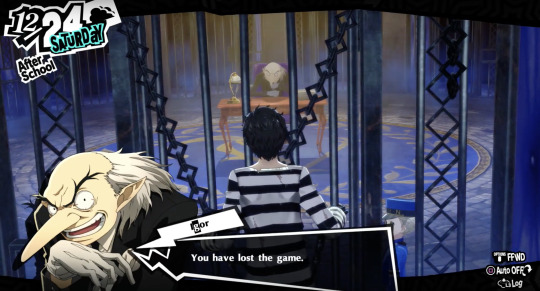
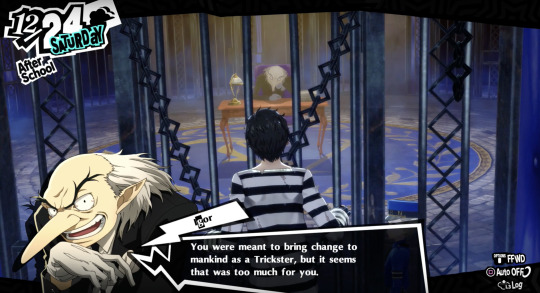
And I'm like, ok, I've seen this a fair few times before. I know the script.
But then I was paying attention, and I just went WAIT WAIT WAIT HANG ON A MINUTE HERE.
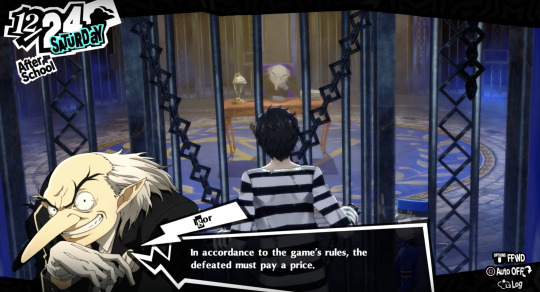
"In accordance to the game's rules, the defeated must pay a price."
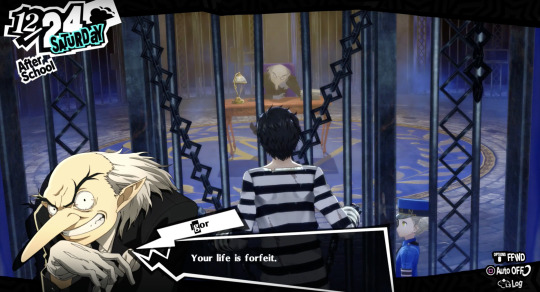
"Your life is forfeit."
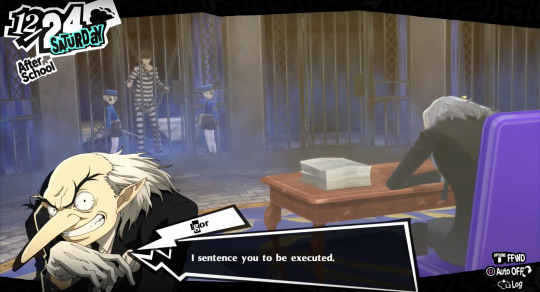
"I sentence you to be executed."
And I was just... hang on. There's been more than one player in the game. If we go back to the earlier lines, "Igor" also says "You were mean to bring change to mankind, but it seems that was too much for you."
In a sense, all of this could also be applied to Goro Akechi.
Akechi was also forcing mankind to react and to change, albeit via chaos and uncertainty rather than encouraging people to stand on their own two feet the way the Phantom Thieves were trying to.
And what happens in the engine room?
Akechi loses the game.
He realises that Akira and the PT fooled him, and when he tries to get the better of them one last time, he fails. We often talk about how after he was defeated he "almost went over to their side" - but isn't that another aspect of his "defeat" in Yaldabaoth's eyes? Akechi admits, effectively, that he accepts the Phantom Thieves' way of doing things over his own.
And it's here that we get Cognitive Akechi, who comes in and starts talking about how the Captain (Shido) sees him, gives him an option to rejoin (or for the PT to switch sides), and.... hm, isn't that familiar?

Here's Caroline saying "If that's what our master wishes..." with Akira having a response tree of-
-"You're going to execute me?" -"Are you serious?" -or just plain being unable to speak (he could also be unspeakably angry, but he seems far more scared than angry, here).

Next, Akira refuses to die, because he has people relying on him.
I'm reminded of how with Akechi, once he's behind that bulkhead door, if you haven't finished his confidant he'll say something to the effect of "So my final enemy is a puppet of myself, how fitting."
If you have maxed his confidant? You get Joker telling him he can't die yet, as he has a promise to fulfil ("I'll hold onto your glove") with the implication that it's something that Akechi can use as motivation to want to keep living.
In both, it's "I can't die, I have a reason to live, and that reason is at least one other person."
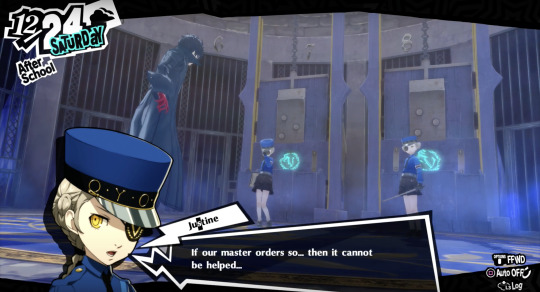
When the twin wardens try to "execute" Akira, now in his Joker attire as his will of rebellion has manifested, Justine says "If our master orders so... then it cannot be helped..."
I'm reminded of how Cognitive Akechi was a being of pure servitude toward his Captain (master), Shido. If the Captain willed it, he'd even die for him.
This one feels similar, because the twins were never supposed to have "execution" as part of their duties at all, and both parties were pushed into a sense of unfailing loyalty to someone who never cared for them, and who warped their duties to something wrong.
In fact, I just went back to confirm the lines for Cognitive Akechi, and-
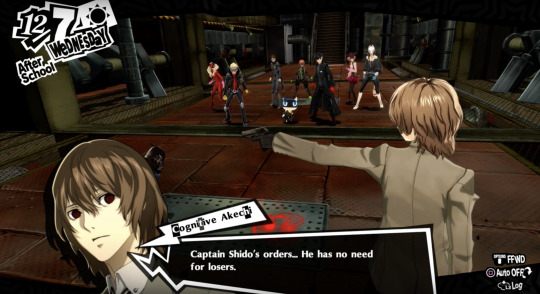

Yup.
Top is Cognitive Akechi saying "Captain Shido's orders... He has no need for losers." and the lower one is "Igor" saying "You have lost the game."
Basically, the same lines.
To the point that...


Cognitive Akechi: "Here, I'll give you one last chance. Shoot them."
God of Control: "I shall grant you an opportunity to make a deal with me."
Both times, it's clear that this is the wrong thing to do, and in both cases, the person being offered rejects said deal entirely - Akechi by shooting the switch to activate the bulkhead door, making it impossible for his cognitive self to attack the Phantom Thieves, and Akira by denying Yaldabaoth and reaffirming his bonds with the Thieves once he's told that they're also there.
I titled the post the way I did, because the way Shido is used by Yaldabaoth, I would not be surprised if Cognitive Akechi isn't just a product of Shido's mind protecting him against threats from, say, his own attack dog, but also?
This is Yaldabaoth's way to quite literally execute the first piece he started to play with, since Goro Akechi had failed as a Trickster and had "lost the game" - and as he and cognitive Akechi both say, losers end up dead.
So the question is - who really killed Akechi? Was it Shido's cognition? Was it Yaldabaoth? And was that cognition even an original part of Shido's palace in the first place, to that extent? How much was it "appropriated" at the "right" time, here?
There are far too many coincidences for me to pass it off as such
But the highlight for me at least, is this:
In both terms of Akira and Akechi's "executions," it's their sense of thinking and feeling that "I can't die, I have a reason to live, and that reason is at least one other person" that keeps them alive. And to the point, it's what keeps Akira's sense of rebellion so strong, and against nigh insurmountable odds.
If anything, it supports the fact that with Akechi's confidant maxed, he really does live, because that, too, echoes Akira's experience in the Velvet Room not even a full month later.
#p5 stuff#goro akechi#Akira kurusu#persona 5#p5 joker#cognitive akechi#p5 yaldabaoth#I went into the videos to do canon recap and wound up with meta#this is my life
256 notes
·
View notes